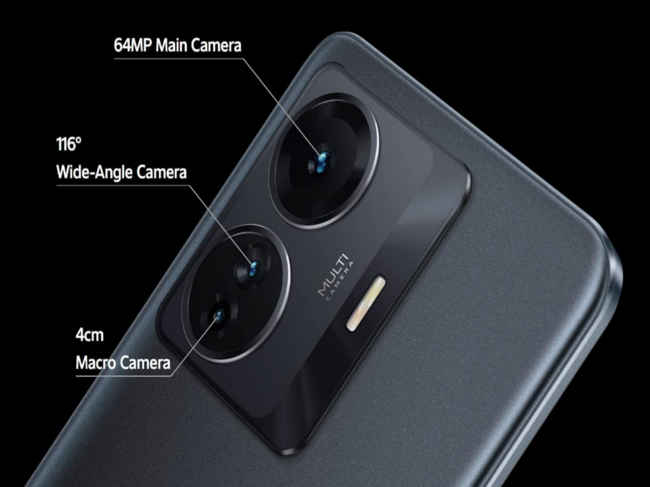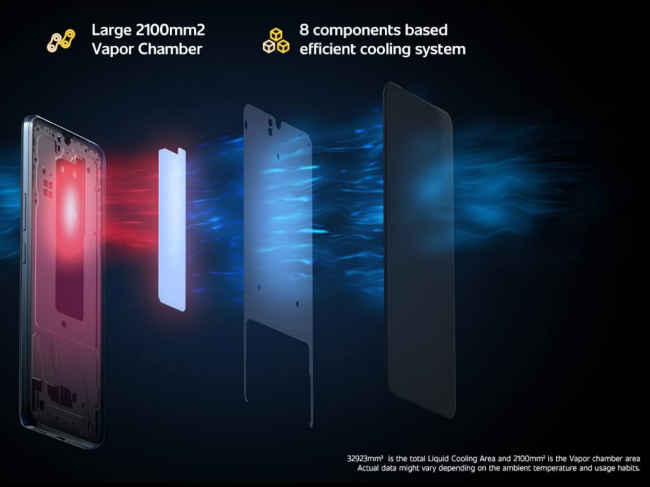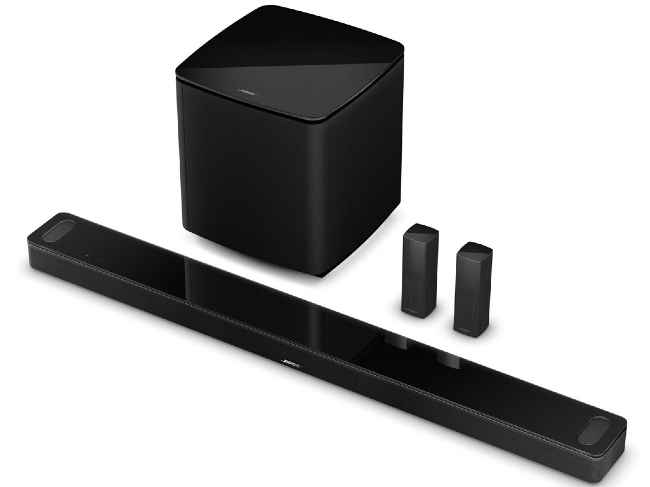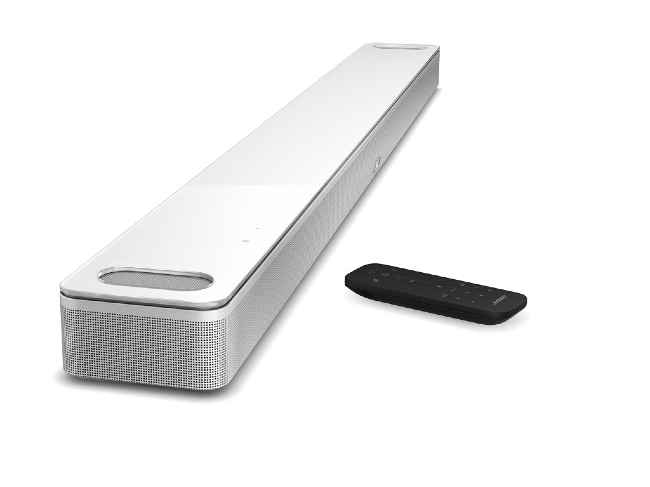The Nokia G21 is priced at Rs 12,999 and is available in two colours: Nordic Blue and Dusk with 4GB/6GB RAM and 64GB/128GB storage. We have been using the Nokia G21 for more than a week now, testing its real-world performance and seeing how it handles day-to-day tasks. Let’s take a look.
The Nokia G21 is the latest budget phone from the house of HMD Global with features like the 50MP triple-camera setup, a 5050mAh battery that is claimed to offer a 3-day battery life and a functional design that feels comfortable to hold in the hand.
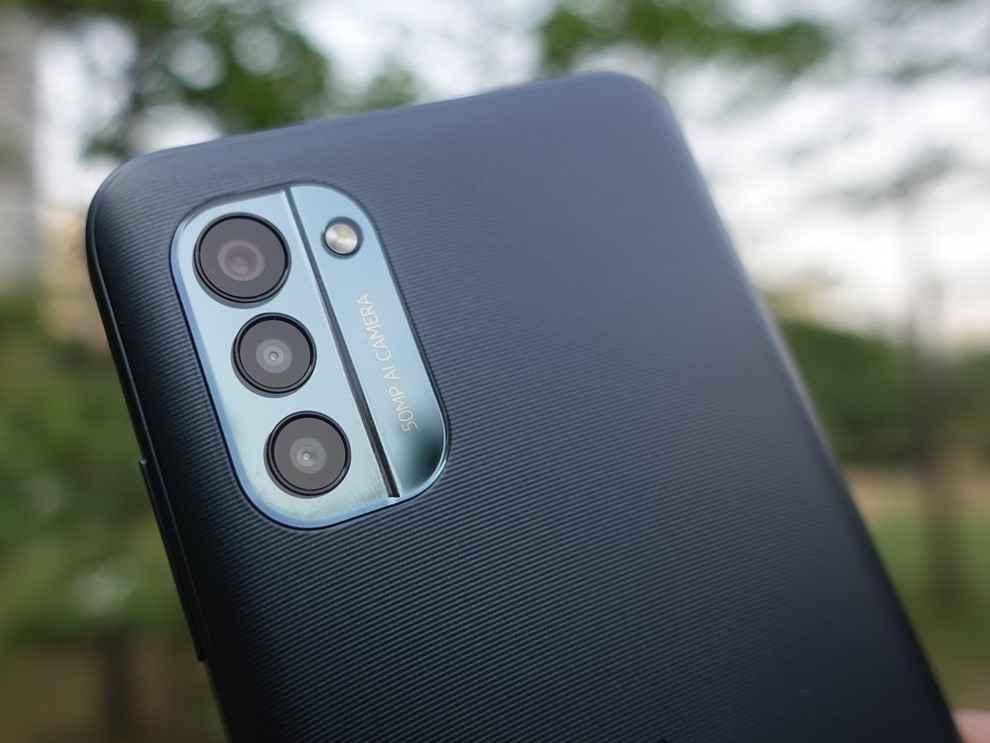
The Nokia G21 is priced at Rs 12,999 and is available in two colours: Nordic Blue and Dusk with 4GB/6GB RAM and 64GB/128GB storage. We have been using the Nokia G21 for more than a week now, testing its real-world performance and seeing how it handles day-to-day tasks. Let’s take a look.
Nokia G21 review: In the Box
Apart from the phone, you get a USB Type-C cable, a TPU protective case, a 10W charging adapter, a quick start guide and a SIM ejector pin inside the retail box.
Nokia G21 review: Key specifications at a Glance
Price: Rs 12,999 - 4GB/64GB | Rs 14,999 - 6GB/128GB
Display: 6.5-inch LCD, HD+ (1600x720 pixels), 90Hz refresh rate
Thickness: 8.5mm
Weight: 190g
Platform: Unisoc T606
RAM: 4GB/6GB
Built-in storage: 64GB/128GB
Expandable storage: Yes, upto 512GB microSD card
5G support: NA
USB-C: Yes
3.5mm jack: Yes
OS: Android 11
Rear Camera: 50MP (f/1.8) + 2MP macro + 2MP depth
Rear Camera Video: 1080p (30FPS)
Front Camera: 8MP (f/2.0)
Speakers: Mono speaker
Battery and charging: 5,050mAh, 18W fast charging (10W charger in the box)
Colours: Nordic Blue, Dusk
Nokia G21 Performance review
The Nokia G21 is powered by the Unisoc T606 chipset that has an octa-core CPU with two Cortex-A75 cores running at upto 1.6GHz and six Cortex A55 cores also running at upto 1.6GHz. On paper, the T606 is a better prospect than the Helio G35 we saw on the Nokia G20. This is paired with upto 6GB RAM and 128GB storage options to choose from with an option to further expand the storage by upto 512GB using a microSD card. It runs on stock Android 11 and is ready for the Android 12 update but we’d have loved it if it launched with Android 12 out-of-the-box. Nokia promises 2 years of OS upgrades and 3 years of security updates for the G21.
The general day to day performance of the Nokia G21 is decent as it does the basics right. I’d also like to tell you here that the G21 is miles ahead of the G20 when it comes to performance and even though it does not match the prowess of something like a Snapdragon 680, it is a good choice for a normal user. In my use, I didn’t notice major lags or frame drops and the 90Hz refresh rate display comes in handy to ensure the phone feels smooth to use.
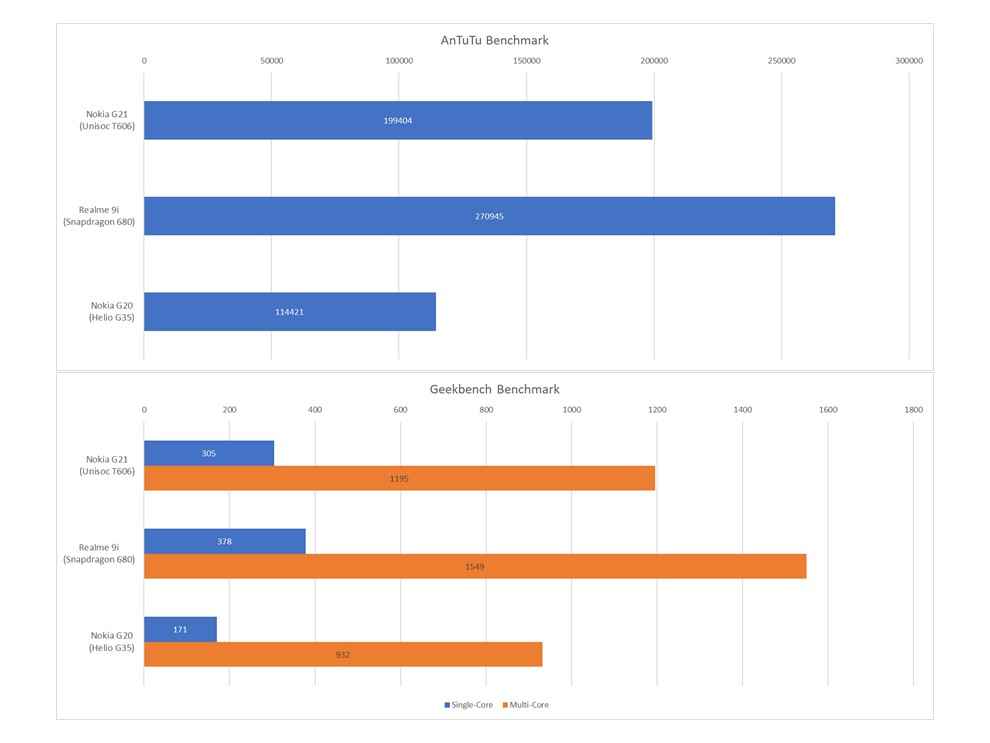
Taking a look at the synthetic benchmark performance of the Nokia G21, it received a decent score on the AnTuTu test but isn’t able to match the performance offered by the Realme 9i which is powered by Snapdragon 680. Similarly, it gets better scores than the G20 in Geekbench single-core and multi-core tests but lags behind its Snapdragon counterpart.
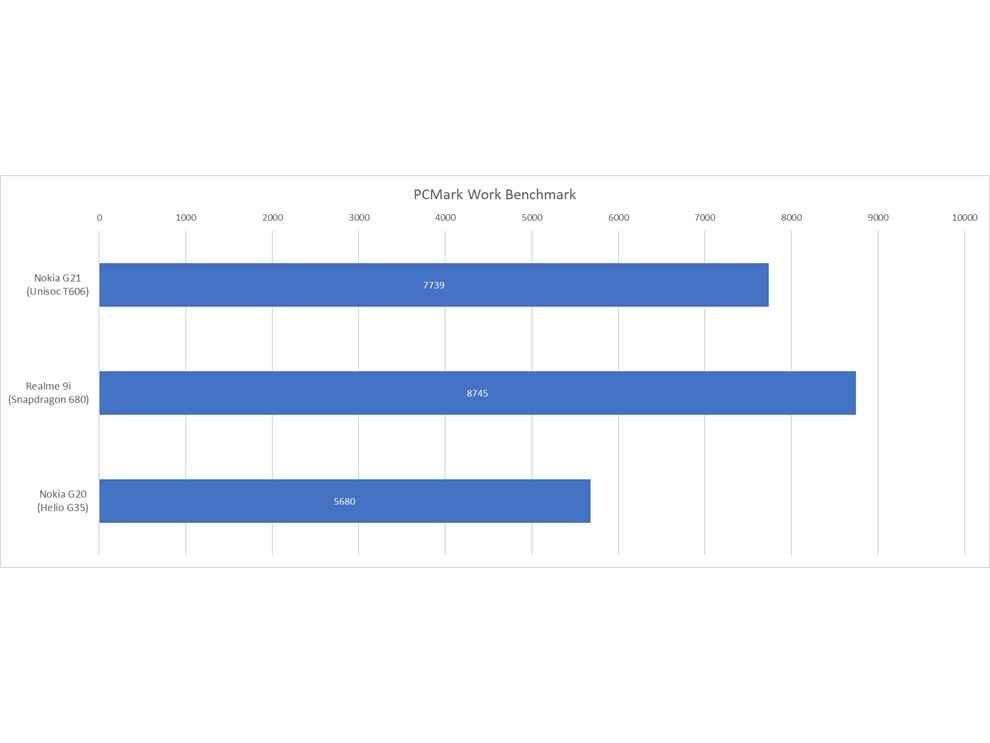
In the PCMark workload test, the G21 got 7739 points while the 9i received slightly better scores at 8745 points. This means that the G21 is perfectly capable of performing tasks like web browsing, photo editing and more without breaking a sweat.
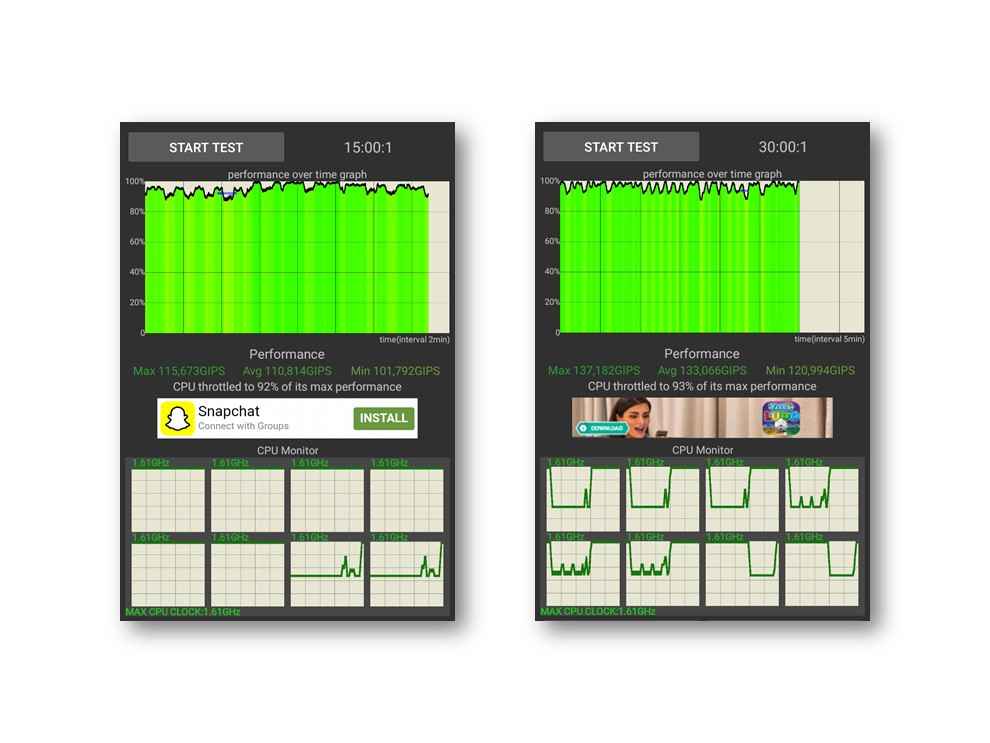
In the CPU throttling test, the Nokia G21 throttled to 92% of its maximum performance which is a pretty good score meaning that it is almost able to run up to its full potential without much effort.
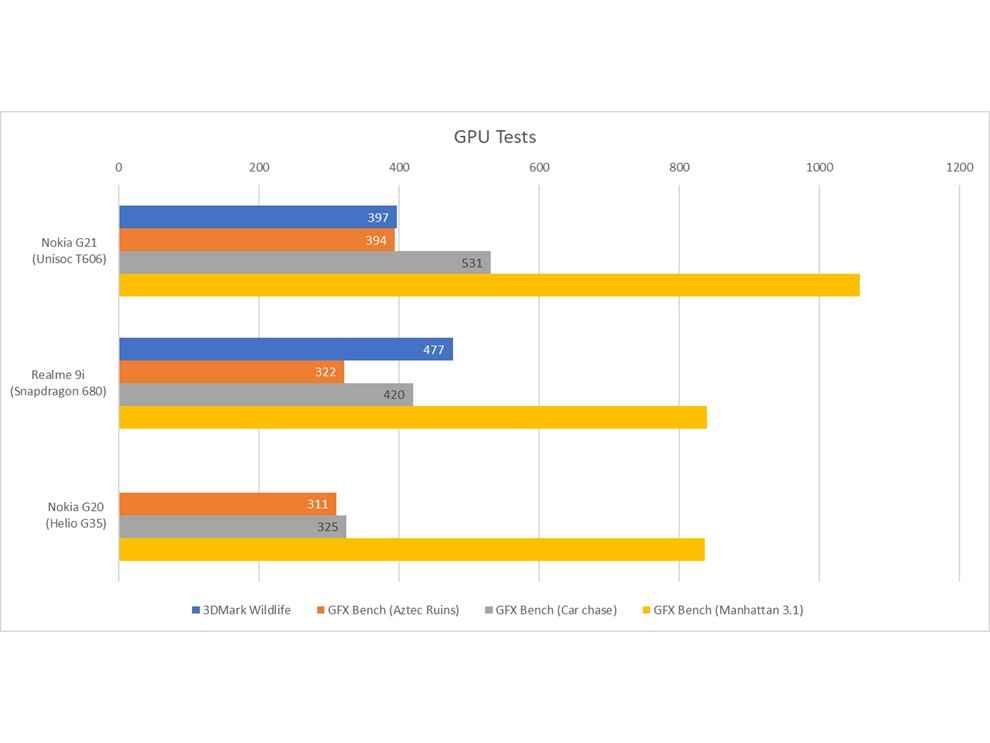
We tried playing some games on the Nokia G21 as well. As you’d have imagined by now, the Nokia G21 is not a phone to play intensive games like Battlegrounds Mobile India and even Asphalt 9. However, it is way better at handling these games than the G20.
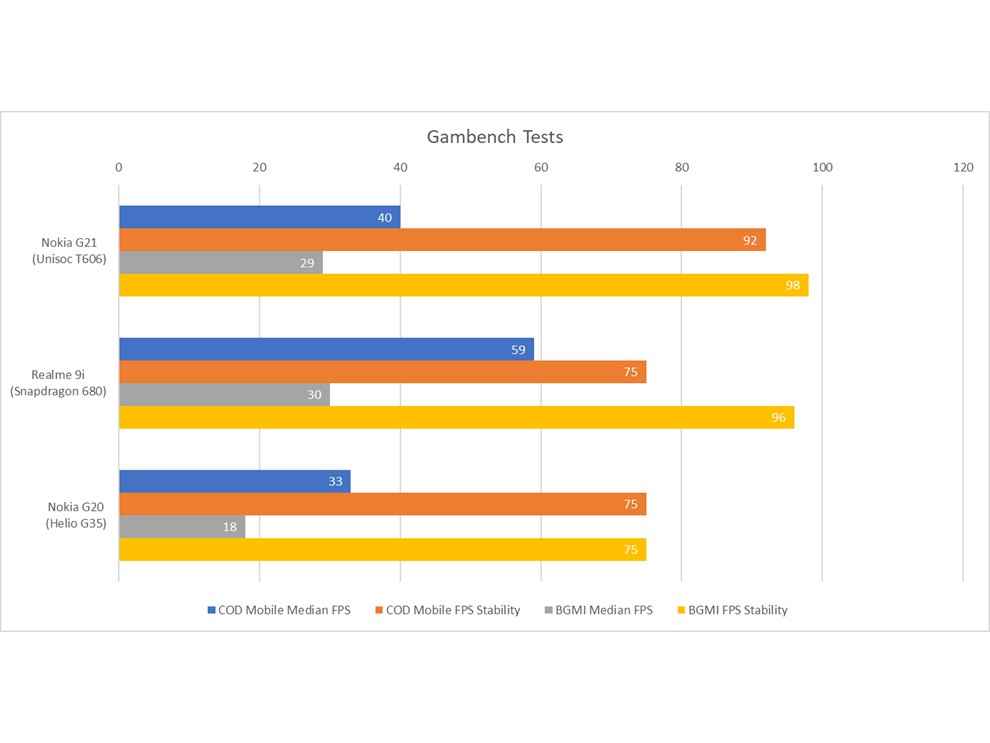
While playing COD Mobile we recorded the graphics performance of the G21 using Gamebench. The G21 ran COD Mobile at 40FPS with a stability of 92% which is pretty good in our experience. During our testing, we experienced some minor frame drops, stuttering and lags which can be fixed by reducing the graphic quality and frame rate. Having said that, if Candy Crush Saga is your go-to game, you need not worry about high performance as the G20 can run it perfectly.
With the Nokia G21, the company has brought in support for dual-band WiFi which was missing from the G20. Additionally, there is a single speaker unit that is positioned on the bottom which is decent and nothing extraordinary. If you listen to music regularly, you will be better off using a pair of earphones as it has a 3.5 mm audio jack.
As for the fingerprint reader, it works just fine and can unlock the phone very quickly, so no complaints there.
Nokia G21 review: Battery Life
The Nokia G21 is equipped with the same 5,050mAh battery as the G20 from last year. However, it still does not support fast charging and comes with a 10W charging adapter in the box. This means that it takes forever to fully charge but the battery life is good enough for most users. Some browsing, casual gaming, watching videos on YouTube and checking out social feeds, the Nokia G21 easily gave us two days worth of battery life on a single charge. After 30 minutes of watching a TV show on Netflix, the battery dipped to 6% and playing COD Mobile for 15 minutes dropped it further by 5%.
Using the 10W charger, it takes 2 hours and 42 minutes to fully charge from 0-100%. The time taken to charge can be slightly reduced by using an 18W charging adapter that is available separately or a PD supported adapter.
Nokia G21 Camera review
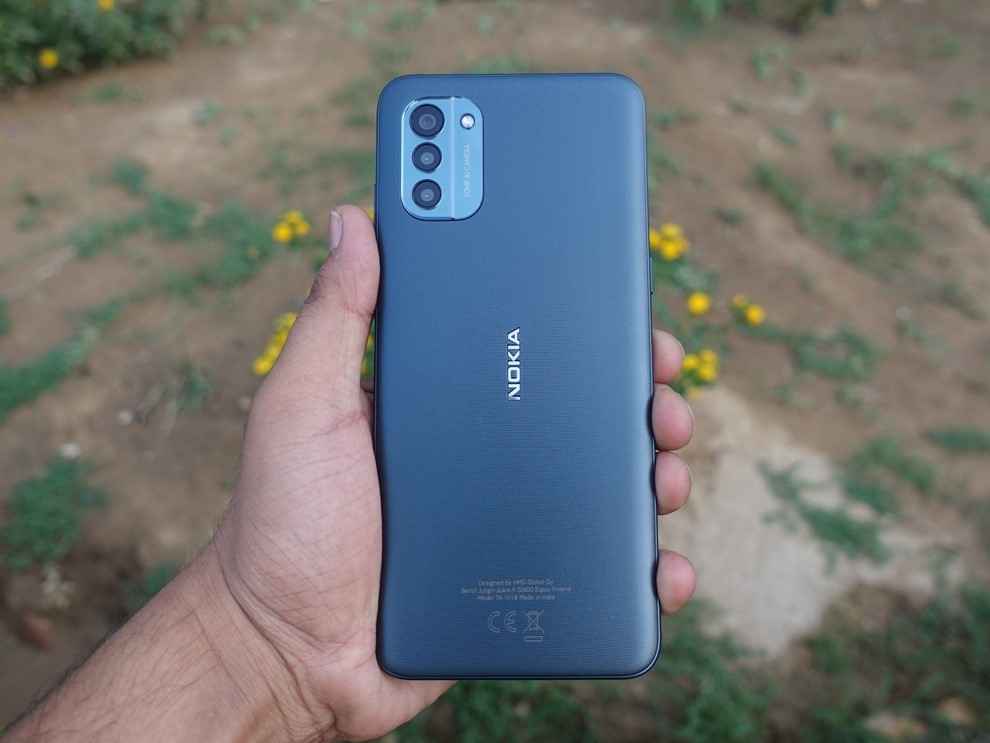
There are three cameras on the back of the G21 including a 50MP primary camera with an f/1.8 aperture, a 2MP macro camera and a 2MP depth sensor. There is an 8MP front-facing camera for selfies as well. The rear and front cameras can both record 1080p videos at 30FPS and support OZO audio that captures surround sound for an immersive experience.
The camera stack from the G20 was one of its major highlights and the G21 follows suit by upgrading the main sensor. That said, the G21 does not get an ultra-wide camera like its predecessor.
In daylight, the cameras of the G21 make some good looking images. The pictures look bright and colourful with natural tones. It is able to capture granular details like shadows and keeps the highlights in check. However, it struggles to lock down the focus and as a result, close up shots don’t have the kind of sharpness and detail retention you’d expect when you go pixel-peeping at a 50% crop ratio.
The main camera can focus properly if the subject in the frame is still otherwise you’ll end up with a blurry shot. The primary camera performs best in well-lit conditions but as you get closer to the end of the day, it will start to show its weakness.
During the night or in low-light environments, the camera tries to bump up the exposure and capture detailed textures but ends up adding more noise. The control over highlights is also not up to the mark and does little to help in improving a night shot.
The other two cameras, especially the macro sensor is just there to make up the numbers and fail to produce good pictures. The depth sensor aids in giving a shallow depth of field to pictures. But the macro camera needs a well-lit environment to produce any usable image and is a hit or miss affair.
Nokia G21 Design and Display review
Credit where credit’s due, the Nokia G21 is really well built. Though it is still made of plastic, it has a patterned design on the back that provides some grip when held in the hand.
On the back, there is a vertical camera module with rounded corners tucked away in the corner and an LED flash to go along. It is available in two colours: Nordic Blue and Dusk.
It has a thickness of 8.5 millimetres and weighs 190 grams, which is thinner and lighter than the G20. The G21 has a comfortable grip and you don’t feel any added heft in daily use. Unlike the G20, the G21 does not come with splash protection.
You get the power button on the right side which doubles up as a fingerprint reader along with volume controls. On the left side, there is a sim tray slot and a dedicated Google Assistant button. On top is a 3.5mm headphone jack and right at the bottom, we get a Type-C port and a speaker grille.
The display on the G21 measures 6.5 inches but only offers an HD+ resolution which is a bummer for a phone in this price range. The screen has a waterdrop notch cutout for the selfie camera and has a slightly wide chin. The addition of a 90Hz refresh rate is welcome and makes user interactions all the more smooth.
The display offers decent brightness levels and in our testing, the peak brightness touched 359 nits while the minimum brightness was at 4 nits. However, the sunlight legibility goes for a toss when you take it outdoors. The HD+ resolution here does little to produce sharp visuals in apps like YouTube and it does not count as an immersive viewing experience that you should get with a phone at this price.
Nokia G21 review: Verdict
The Nokia G21 builds upon some of the limitations of the G20 for us to be able to recommend it. However, only if you’re looking for a pretty basic, no-nonsense smartphone. In terms of upgrades over the G20, the G21 gets support for 90Hz refresh rate, better performance, dual-band WiFi and a thin, lightweight profile. However, you cannot look past some of the drawbacks that still exist like the single speaker, a 10W fast charger in the box and HD+ resolution.
While the performance has improved by miles over the G20, it does not get better than the Snapdragon 680 found on phones like the Redmi Note 11 and Realme 9i which are better value for money options under Rs 15,000.
Nokia has brought about solid upgrades to the G21 but it does little to impact the dominance of competing brands like Xiaomi and Realme and their value offerings in the budget segment.
from Mobile Phones Reviews https://ift.tt/AYMwvx2
